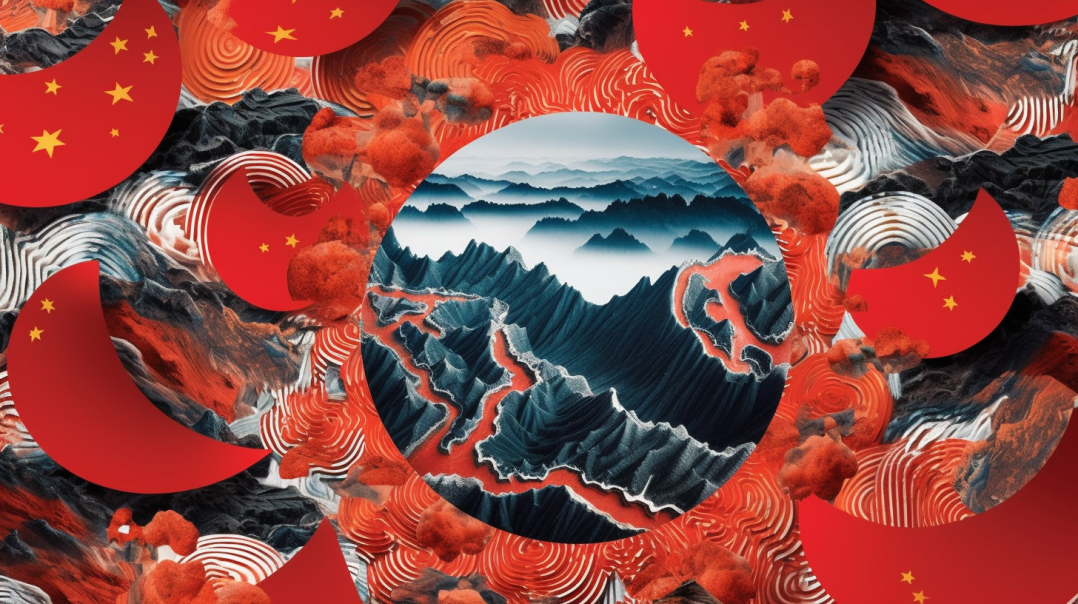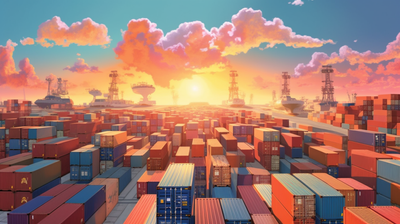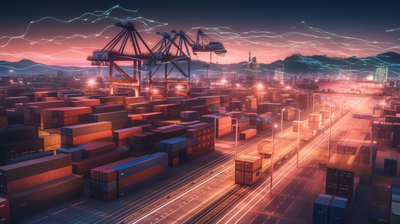Navigating Complexity: Unraveling the Challenges and Assumptions Surrounding China's Future - Insights from Peter Zeihan
In contemplating the intricate interplay between China's growth and the American system, one must inquire why the former would jeopardize the latter, thereby seemingly courting economic suicide. A comprehensive analysis of the multifaceted circumstances within China reveals a landscape teeming with complexities. While a deep exploration of these complexities is warranted, it is crucial to highlight the faltering state of the Chinese economic model as a distinct entity, irrespective of its relationship with the United States or globalization. Additionally, China faces a severe demographic crisis, as it now concedes to overestimating its population by over one hundred million individuals, predominantly concentrated among those aged forty and below.

Aware of the inevitable decline of their economic power within this decade, the Chinese leadership is aware of the significant impact they will likely endure due to the Ukraine conflict. Given their position at the terminus of various supply lines, even the slightest disruption anywhere in the system could leave them bearing the brunt of the consequences. Moreover, China's hyper-financialization model, characterized by the printing of currency to fuel economic activities and maintain employment rates, though inefficient, has been pursued with more tremendous enthusiasm than any nation in history. Yet, it remains pertinent to acknowledge the historical pattern wherein countries embracing such a model have ultimately faced financial crashes. Consequently, China grapples with challenges: a failing political system, an impending demographic crisis, and a precarious economic structure. All these factors culminate in a critical juncture this decade, wherein growth may no longer be an integral component of the Chinese narrative.
Complicating matters further, the Chinese leadership's primary focus is maintaining control rather than pursuing comprehensive expertise in economics, trade, or manufacturing. Recent appointments to key positions have predominantly favoured individuals who exhibit conformity rather than technical proficiency. Such a shift in leadership underscores a paradigm where control assumes primacy. Suppose the Chinese Communist Party (CCP) were to orchestrate an economic collapse resulting in a two-thirds reduction and a famine, all while ensuring the perpetuation of their authority. In that case, they might perceive it as a sacrifice worth making. Consequently, when one considers China's significant advantages through the influx of US dollars into its economy, effectively facilitating its infrastructure development, attempting to sustain its world power status becomes increasingly untenable.

Contrary to conventional wisdom, China can no longer be regarded as an unassailable global power. Although they possess a more significant number of vessels, approximately 600 compared to the United States' 300, the diminutive size of the former's ships renders them vulnerable. Moreover, incapable of traversing beyond the first island chain, China's range is severely limited, curtailing its reach and undermining any claims of being a true world power. This analysis compels us to reconsider the apparent inevitability of an attack on Taiwan, an issue that China has persistently deemed within its proper sphere of control. However, it is essential to recognize the Chinese leadership's penchant for irrational and authoritarian decision-making, often to their detriment. Nevertheless, a contrarian perspective suggests that the outbreak of war, particularly against Taiwan, remains neither imminent nor inevitable but rather an unlikely outcome.
The Chinese perspective on Taiwan bears similarities to the Russian view on Ukraine. Both situations necessitate a nuanced examination, highlighting the assumptions that inform each party's strategic preparations. Taiwan has adopted a comprehensive, long-term approach in anticipation of a potential conflict, starkly contrasting China's alleged belief in the ease of victory. The disparity in readiness is stark, with Taiwan having dedicated 45 years to fortifying its defences, while the Ukrainians had a mere eight years of preparation. The respective regions' geography further exacerbates China's challenges, as Taiwan's insular nature poses significant hurdles to any potential military aggression. Furthermore, considering the United State's status as a dominant naval power and Taiwan's insular configuration, China's prior assumptions are rendered untenable.

China's reliance on Russia's weaponry to bolster its military prowess further undermines its strategic calculations. Seeking to appropriate Russian intellectual property and duplicate their military technology, China now grapples with the consequences of a two trillion-dollar case of buyer's remorse. Moreover, China's assumption that Russia's significance to the global community would protect them from significant sanctions is proving increasingly fallacious. Thus, it becomes evident that despite its economic inefficiencies, Russia's prominence as the world's leading producer and exporter of energy and food products remains a considerable liability for China.
Daniel's Take:
- China's economic model is faltering independently of its relationship with the United States or the phenomenon of globalization.
- China's demographic crisis, resulting from an overestimated population, poses significant challenges to its long-term stability.
- The Chinese leadership faces a confluence of predicaments, including a failing political system, impending demographic decline, and a precarious economic structure.
- The hyper-financialization model pursued by China has historically led to crashes, and the nation's excessive reliance on this approach exposes it to considerable risk.
- Control assumes primacy over expertise in the Chinese leadership's decision-making, potentially sacrificing economic stability to maintain political authority.
- Despite possessing a more significant number of vessels, China's naval capabilities are limited, casting doubt on its status as an unassailable global power.
- The outbreak of war, particularly against Taiwan, is unlikely to occur in the foreseeable future.
- China's assumptions regarding the ease of victory and the replicability of Russian weaponry have proven flawed, leading to buyer's remorse and geopolitical vulnerabilities.
- Russia's economic significance as a significant energy and food producer undermines China's assumption of insulation from sanctions.
Cameron's Take:
Nothing that has happened in China over the past several years has surprised me at all. There is one of the areas where I agree with Zeihan. China has always been a paper tiger. The great fear that China will grow old before they grow rich is being realized before our very eyes. Dan's points that China is over-financialized has been a known problem since China's introduction to global trade in 1989. Their government debt, as well as, their private sector debt that is nominally also owed by the government has been a house of cards dependent on 6% growth and the largest urbanization effort in human history. There are far fewer people to move into cities now than there were before. Growth in China was slowing before the pandemic and has now fallen off a cliff. What does this mean? It means China is looking for new friends. Beijing is trying to get the war in Ukraine to stop because they understand that the longer that conflict goes on, the more each side will dig in and China is going to be caught having to do something they do not like to do: pick sides.
The Chinese military has never been anything to fear and Zeihan points out that they can't go too far because they will simply run out of gas. Taiwan doesn't quite benefit from this however because Taiwan is close enough for China to arrive on their shores and with short enough supply lines to keep troops in food and ammunition for a protacted and urban fight. "Great Leader" Xi Jinping (who thinks he is the new Mao, hence the title) has declared that Taiwan will be captured by the end of the decade. He made a big deal about Taiwan at China's Communist Party conference in 2022 during the announcement of the next 5 year plan. I disagree with Zeihan here, I think China will attempt to take Taiwan and I think it will likely be about as successful as Russia's invasion of Ukraine with similar disastrous results for all parties involved. The downside to an invasion of Taiwan is that unlike Ukraine, the US will likely be directly involved and that will expand the conflict considerably in short order.
I will say that Beijing is getting more cozy with Moscow and that could lead to quite a partnership. Russia has natural resources, China does not and if they increase trade ties then that could be an economic powerhouse that isn't dependent on the West. China could use its infrastructure in the former Soviets to move things along it's "Belt and Road" and create a sigificant corridor of economic growth stretching from Moscow to Beijing and every point in between. This is in harmony with a prediction I read in Foreign Affairs a few years ago where they said in the new order, most of the action between countries will happen on the Eurasian continent and because of geography, the US will sort of be marginalized because the US is far from where the action is happening. If Russia and China can overcome their differences and increase trade ties, then the EU should really start investing more in defense because that could pose a major threat.
Speculating on the Good (καλός) related to this writing:
A deep analysis of China's circumstances provides valuable insights into the complexities surrounding its position as a global power. By unravelling the intricacies of China's economic, demographic, and political challenges, we gain a deeper understanding of the potential risks and vulnerabilities it faces. Such knowledge fosters informed discourse and allow for more prudent geopolitical decision-making. Examining China's assumptions and subsequent unravelling provides a valuable cautionary tale, underscoring the significance of comprehensive strategic planning and the perils of overreliance on flawed models.






